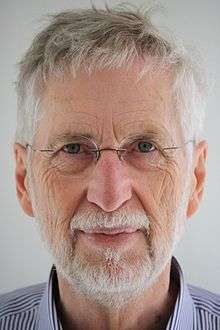Volker Hage
| Volker Hage | |
|---|---|
 Volker Hage (2015) | |
| Born |
Volker Hage 9 September 1949 Hamburg |
| Occupation |
Journalist Literary critic Author |
Volker Hage (born 9 September 1949 in Hamburg) is a German journalist, author and literary critic.
Life
He began his career as a journalist in 1975 with the Frankfurter Allgemeine Zeitung, working initially for the Literature section and later for the newspaper's weekly “FAZ Magazin” colour supplement. Between 1986 and 1992 he was chief literary editor of another leading (West) German newspaper, Die Zeit, for which he has continued to write subsequently.[1] Since 1992 he has worked on Der Spiegel where he has served as Culture Editor (“Redakteur im Kulturressort”).[2] He was the founder of the periodical “Deutsche Literatur” (“German Literature”), published by Reclam and he has produced various anthologies and collections.
Between 1988 and 1994 Hage was a member of the jury for he annual Ingeborg Bachmann Prize. More recently, in 2005 and 2006, he sat on the jury for the German Book Prize.
Volker Hage has written biographies of Max Frisch, Walter Kempowski, John Updike, Philip Roth and (together with Mathias Schreiber) of Marcel Reich-Ranicki. He has also been involved in rediscovering the ”realist” genre work of the writer Gert Ledig. This came during the course of Hage’s contributions to the debates, initiated by Max Sebald, about the literary treatment of the bombing of German cities during the Second World War. Hage was particularly effective as an advocate for Ledig’s second novel, Vergeltung, a powerfully apocalyptical and autobiographical anti-war narrative.
In an engagingly two-edged assessment, fellow critic Marcel Reich-Ranicki wrote that Hage’s style of literary criticism had the great advantage that you always knew in advance precisely what he wanted to say.[3][4]
Publications
- Max Frisch (Rowohlts Monographien 321). Rowohlt, Reinbek 1983, ISBN 3-499-50321-2
- Alles erfunden: Porträts deutscher und amerikanischer Autoren. Rowohlt, Reinbek 1988, ISBN 3-498-02888-X
- Marcel Reich-Ranicki. Kiepenheuer und Witsch, Köln 1995, ISBN 3-462-02365-9 (gemeinsam mit Mathias Schreiber)
- Auf den Spuren der Dichtung. Reisen zu berühmten Schauplätzen der Literatur. Goldmann, München 1997, ISBN 3-442-75005-9
- Propheten im eigenen Land. Auf der Suche nach der deutschen Literatur. Deutscher Taschenbuchverlag, München 1999, ISBN 3-423-12692-2
- Zeugen der Zerstörung: die Literaten und der Luftkrieg. S. Fischer, Frankfurt am Main 2003, ISBN 3-10-028901-3
- John Updike: eine Biographie. Rowohlt, Reinbek 2007, ISBN 3-498-02989-4
- Letzte Tänze, erste Schritte: deutsche Literatur der Gegenwart. Deutsche Verlagsanstalt, München 2007, ISBN 3-421-04285-3
- Philip Roth. Bücher und Begegnungen. Hanser, München 2008, ISBN 3-446-23016-5
- Schiller. Vom Feuerkopf zum Klassiker. btb Verlag, München 2009, ISBN 3-442-74009-6
- Walter Kempowski, Bücher und Begegnungen. Knaus Verlag, München 2009, ISBN 978-3-8135-0337-1
- Max Frisch - Sein Leben in Bildern und Texten, Suhrkamp Verlag, Berlin 2011, ISBN 978-3-518-42212-0
Notes and source
- ↑ http://www.zeit.de/schlagworte/personen/volker-hage/index
- ↑ http://www.perlentaucher.de/autor/volker-hage.html
- ↑ Hages… „Buchbesprechungen […] einen großen Vorzug haben: Man weiß immer genau, was er sagen will.“
- ↑ Marcel Reich-Ranicki: Die Sache mit dem Nobelpreis. In: Frankfurter Allgemeine Sonntagszeitung, 18. März 2007, P 29